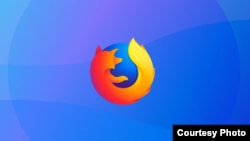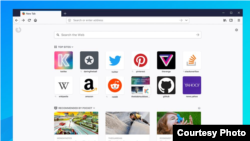Mozilla has released a new update of its Firefox browser that it says is much faster and provides a better overall user experience. But can the new version – called Firefox Quantum – compete with the world’s current top browser, Google Chrome?
Firefox is an open source browser created by the not-for-profit Mozilla Foundation. The foundation says it has different goals than companies like Apple and Google, which must focus on making a profit.
Mozilla aims to create new products to keep the internet “a global public resource” that remains open and free to all people. It urges developers to contribute to its technology and use the Firefox source code with other products.
Firefox 1.0 launched in 2004 when Microsoft’s Internet Explorer dominated the browser market for personal computers.
Firefox also followed the failure of Netscape Navigator, another major browser that did not survive the competition from Internet Explorer. Navigator had also been used in Mac computers. But in 2003, Apple released its Safari browser, which is still used today.
The number of Firefox users grew over the years, offering a challenge to Internet Explorer’s global influence.
Wired magazine reports Firefox currently has about 90 million users around the world. While this is a big number, the overall browser usage for Firefox worldwide is still quite small, about six percent. Google Chrome is leading with 55 percent browser usage, while Safari has about 15 percent.
In launching its new version, Mozilla said Quantum is “by far the biggest update” in Firefox history. The most important message Mozilla is sending is that Quantum is fast – really, really fast.
Is this true? And what else can this browser do? Is it worth downloading and taking for a test drive?
Major speed upgrade
Yes, it is fast. The new Firefox performs today at speeds twice as fast as just six months ago, tests showed on the Speedometer 2.0 system. The Speedometer measures how the browser handles many different web operations at the same time.
There have been mostly positive reactions to the speed of Firefox Quantum by technology publications and the public.
Digital Trends noted the browser was “faster and even more minimalist.” It added, Firefox Quantum makes Chrome look old.” PC Magazine said Quantum had made major progress with “turbocharged performance, a new look, and better memory usage.”
Firefox user Erik Berlin tweeted his results. “In all seriousness, I spent the day using Firefox Quantum and it really is faster than Chrome, with a smaller memory footprint, and less battery drain. Worth a try!”
Less memory usage
Mozilla says Quantum was built to greatly reduce the amount of computer memory used. In its own tests, Firefox researchers found the new browser used about 30 percent less memory or RAM than Chrome.
Tab, tab away
One result of lower memory usage is that more pages can load faster and operate at the same time. Earlier this year, Mozilla developer Dietrich Ayala even reported Quantum was able to open nearly 1,700 separate browser tabs in just 15 seconds.
Quantum also provides private browsing controls that block ads and do not remember the user's history.
New User Interface
Firefox Quantum comes with a new design featuring blocked tabs along the top, with a wide search box below.
In the middle of the browser are links to the top sites you visit, as well as recommended and trending stories. Quantum also includes Mozilla’s Pocket bookmarking service, which works to quickly save web pages and content for later use.
A new tool, Firefox Screenshots, makes it easier to cut and save any parts of the browser screen.
Mozilla said Quantum’s browser is the result of studies on how people use the web today. “We looked at real world hardware to make Firefox look great on any display, and we made sure that Firefox looks and works like Firefox regardless of the device you’re using,” Mozilla explained in a blog post.
Google search built in
Firefox has been using Yahoo as its default search engine for the past three years after signing a deal with Yahoo. But that ended with the launch of Quantum. So even though the new browser is a clear competitor to Google Chrome, Mozilla decided to give its users default access to the hugely popular Google search engine.
I’m Bryan Lynn.
And I'm Jill Robbins.
Bryan Lynn wrote this story for VOA Learning English. Hai Do was the editor.
We want to hear from you. Write to us in the Comments section, and visit our Facebook page.
______________________________________________________________
Words in This Story
browser– n. computer program used to find and look at information on the internet
apparently – adv. some that appears to be true based on what is known
dominate – v. to have control or power over someone or something
challenge – v. to question the action or authority of someone or something
minimalist – adj. showing as little action or involvement as possible
turbocharged – adj. very powerful or exciting
hardware – n. collection of physical parts of a computer system
default – n. what exists or happens if no changes are made
access – n. the right or chance to use or see something







